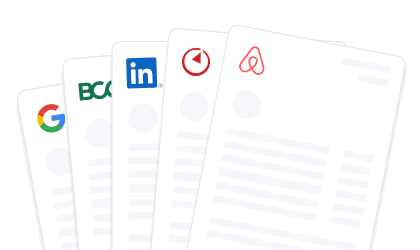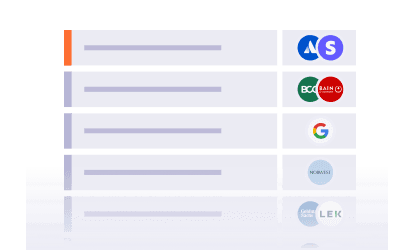What is Career Planning and How Can It Set You Up for Success? A Comprehensive Guide
Discover the importance of career planning, and how it can help you achieve your professional goals.
Posted June 13, 2025

Join a free event
Learn from top coaches and industry experts in live, interactive sessions you can join for free.
Table of Contents
Are you feeling stuck in your career? Unsure of what steps to take to reach your goals? Or are you just starting out in your professional journey and want to make sure you're on the right path? Career planning can help you find direction, purpose, and success in your chosen field. In this comprehensive guide, we'll explore the many benefits of career planning, how to get started, what challenges to expect, and how to overcome them. Let's dive in!
The Benefits of Career Planning: Why It's Important for Your Future
When you take the time to plan your career, you are setting yourself up for success. Career planning allows you to take control of your professional life and focus on your goals. It helps you assess your skills, interests, and values, and align them with opportunities that support your aspirations. It can also increase your job satisfaction, improve your work-life balance, and enhance your earning potential. By committing to career planning, you are making an investment in your future.
One of the key benefits of career planning is that it helps you stay relevant in your industry. As technology and trends change, it's important to stay up-to-date with the latest developments. By planning your career, you can identify areas where you need to improve your skills or gain new ones. This can help you stay competitive in the job market and increase your chances of landing your dream job.
Career planning can also help you build a strong professional network. By attending industry events, joining professional organizations, and connecting with colleagues, you can expand your network and gain valuable insights into your field. This can lead to new job opportunities, mentorship, and even lifelong friendships.
Getting Started with Career Planning
Assessing Your Skills and Interests
The first step in career planning is to assess yourself and your goals. Take a look at your skills, interests, and values. What do you enjoy doing? What are you good at? What motivates you? Consider taking a career assessment test to get a better sense of your strengths and weaknesses. You can also consult with a career counselor or mentor who can provide valuable feedback and guidance.
Once you have a better understanding of your skills and interests, it's important to research different career options that align with them. Look into job descriptions, required qualifications, and potential salary ranges. You can also reach out to professionals in fields that interest you and ask for informational interviews to gain more insight into their day-to-day work.
It's also important to consider the current job market and industry trends when making career decisions. Research which industries are growing and which ones are declining, and think about how your skills and interests fit into those trends. Additionally, consider the potential for job growth and advancement within a particular field.
Exploring Career Options: Researching Industries and Job Markets
Once you have a better understanding of your skills and interests, it's time to explore career options. Research different industries and job markets to find opportunities that match your skills and aspirations. Consider job growth, work-life balance, salary potential, and job satisfaction ratings. Look for industries and positions that align with your values and interests. This research will be the foundation for mapping out your career path.
Mapping Out Your Career Path
Setting Goals and Creating a Plan
Once you've identified your skills and interests and explored career options, it's time to start setting goals and creating a plan. Define your long-term career goals and break them down into smaller, achievable steps. Create a timeline and action plan to keep yourself accountable. Set benchmarks along the way to measure your progress. Whether you're aiming for a promotion, starting your own business, or switching careers, having a well-defined plan will keep you on track.
Building the Skills You Need: Developing Your Talents and Abilities
To excel in your chosen field, you will need to develop the skills and abilities that are required. Take courses, attend workshops, or pursue additional education to build your expertise. Seek out opportunities to gain hands-on experience and develop a strong network of professional contacts. Practice crucial professional skills such as communication, time management, and leadership. By constantly learning and growing, you'll be better equipped to achieve your career goals.
Networking and Building Connections: Making the Most of Your Professional Relationships
Your professional relationships can be a valuable asset in achieving your career goals. Attend industry events, join professional organizations, and connect with colleagues and mentors to build a network of contacts. Look for opportunities to collaborate and share knowledge. Leverage social media to build your brand and expand your reach. By cultivating positive relationships with others in your field, you'll be better positioned to seize opportunities and achieve success.
Executing Your Career Plan
Staying Motivated and Focused: Maintaining Momentum on Your Career Journey
It's important to stay motivated and focused as you work toward your career goals. Celebrate small successes along the way and stay positive. Monitor your progress and adjust your plan as needed. Surround yourself with supportive people who can help keep you motivated. Stay curious and keep learning new things in your field. By staying committed and focused, you'll be better positioned to achieve success.
Overcoming Challenges and Obstacles: Strategies for Dealing with Setbacks
When you're working toward your career goals, setbacks are inevitable. You may face rejection, disappointments, or unexpected obstacles. The key is to stay resilient and persistent. Don't lose sight of your long-term goals and be willing to adapt your plan as needed. Seek support from mentors, friends, or colleagues when you need it. Maintain a positive attitude and keep pushing forward.
Measuring Success and Making Adjustments: Evaluating Your Progress and Making Changes as Needed
As you work through your career plan, it's important to periodically evaluate your progress and make adjustments as needed. Revisit your long-term goals and assess how far you've come. Celebrate successes and identify areas for improvement. Look for opportunities to take on new challenges and expand your skillset. Consider seeking feedback from colleagues or mentors to get an outside perspective. By being proactive and making adjustments as needed, you can stay on track toward your career goals.
Conclusion
Career planning is a journey, not just a destination. By committing to this process, you can find greater purpose, direction, and success in your professional life. Remember to stay resilient, stay open to opportunities, and stay focused on your long-term goals. With the right mindset and strategies, you can achieve the career success you deserve!
Read next:
- How to Negotiate Your Salary – With Example Emails
- Six Tips for Balancing Mental Health in a Corporate Job
- Finding Meaning in Your Career: How to Align Your Passion with Your Professional Life
- The Rise of Remote Work: How to Thrive in a Virtual Career
- Crafting Your Dream Career: A Step-by-Step Guide to Designing Your Professional Journey
Browse hundreds of expert coaches
Leland coaches have helped thousands of people achieve their goals. A dedicated mentor can make all the difference.


























